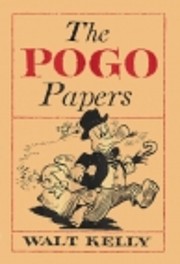

Click on a thumbnail to go to Google Books.
|
Loading... The Pogo Papersby Walt Kelly
 None No current Talk conversations about this book.   ) )I mean the bizarre dialect, the constantly changing backgrounds [in Krazy Kat]...I wish I thought that that kind of work were possible today ... In the first place, I don't know who would put enough energy into their work anymore to do something like that; secondly, and probably more importantly, comic strips are being printed at such a ridiculous size that elimination of dialogue and linework is almost a necessity and you just can't get that kind of depth. I think of Pogo, another strip that had tremendous dialogue and fantastic backgrounds. Those strips were just complete worlds that the reader would be sucked into. For a few moments a day we could live in Coconino County; the whole thing was entirely there. The dialogue was part of it, the backgrounds were part of it, the characters were off-beat, and you need a little space and time to develop that sort of thing. I know for a fact that nobody's doing it now and I don't know that anybody will do it. Garry Trudeau is the only cartoonist with the clout to get his strip published large enough to accomodate extended dialogue. It's a shame. -- Bill WattersonBill Watterson, the creator of Calvin and Hobbes, has long been my hero. In fact, I probably learned more about artistic integrity (and integrity in general) through a little essay he wrote in [b:The Calvin and Hobbes Tenth Anniversary Book|24813|The Calvin and Hobbes Tenth Anniversary Book|Bill Watterson|http://d.gr-assets.com/books/1348186666s/24813.jpg|692719], when I was just a teenager. In it, he talked about the devolution of the comic strip, an artform that many people consider "low art". But Watterson showed how he could elevate the form by not writing throw-away jokes, by not outsourcing his strips to ghostwriters, and by not licensing his characters to be used on coffee mugs. Instead, he created characters who developed over time and had full personalities. He never went for the easy joke, but instead, opted for moving moments. Oftentimes the funny part of his strips were not only at the end of the 4 panels, where the punch-line resides, but in the dialogue that lead up to it. His strips were creative, imaginative, playful and hilarious. I fell in love with Calvin and his imagination, with Calvinball and G.R.O.S.S. and his dinosaurs. And some of my favorite strips were the rare ones with no joke at all, where he risked letting the characters simmer in a wistful quiet moment. Watterson really did deliver on his promise of pushing the boundaries of the medium, of setting a "high art" standard for what is commonly known as "low art". Or rather, of dismissing these boundaries entirely. I haven't read any other comic strip that has moved me as much as Calvin and Hobbes. And so, I followed Watterson's recommendation and was eventually introduced to Krazy Kat and now Pogo. I had kept that name "Pogo" in the back of my mind for years, but only recently stumbled across a copy of The Pogo Papers at a library book sale. And what a treat it was. True to Watterson's word, an entire world opened up to me, a swampy muggy world filled with animals of every kind. It's full of slap-stick, puns, sophisticated wordplay, political commentary, and cultural references. They speak a sort of patois in Pogo but it's just English with a certain kink to it. And some of these jokes have bite: the whole last 50 pages or so is one long critique of Joseph McCarthy (in the form of "Simple J. Malarkey"). Unfortunately, this also means that some of the more time-specific jokes went right over my head. But the beauty of this strip is that there are jokes working on 4 or 5 levels: language, artwork, action, plot, allusions, etc. and if you miss a joke, don't miss a beat because here comes another! I thoroughly enjoyed reading this slowly and in small portions over the past weeks, savoring every element of this lost art. Here's a little taste of the graphics and dialogue... The first romantic entanglements with Pogo and Mam'selle Hepzibah. Introduces Porky's Uncle Baldwin, and one of the memorable quotes from "Pogo": "Eventually ever' man gotta face the problem of tryin' to figger if it's worthwhile to prove that he is himself." The first singing of "Deck Us All With Boston Charlie" is here. Introduces Mole MacCarony and Simple J. Malarkey in another indictment of McCarthyism that people forget how brave it was at the time. One of the most powerful "Pogo" sequences is here, and also another "World Series". At this time Kelly was producing some of the best comic strip writing and art ever produced. no reviews | add a review
Belongs to SeriesPogo (4)
No library descriptions found. |
Current DiscussionsNonePopular covers
 Google Books — Loading... Google Books — Loading...GenresMelvil Decimal System (DDC)741.5Arts & recreation Design & related arts Drawing and drawings Comic books, graphic novels, fotonovelas, cartoons, caricatures, comic stripsLC ClassificationRatingAverage: (4.5) (4.5)
Is this you?Become a LibraryThing Author. |
|||||||||||||||||||||||||||||||||||||||||||||||||||||||||||||||||||||||||||||||||||||||||||||||||||||||